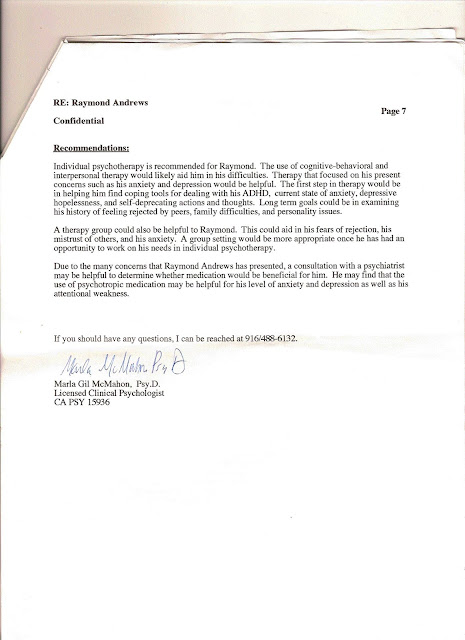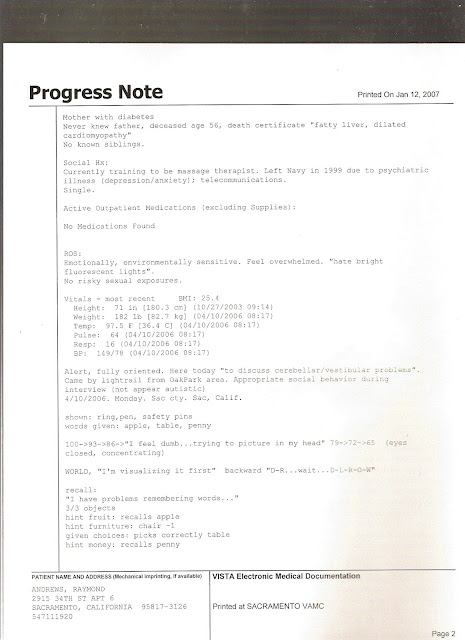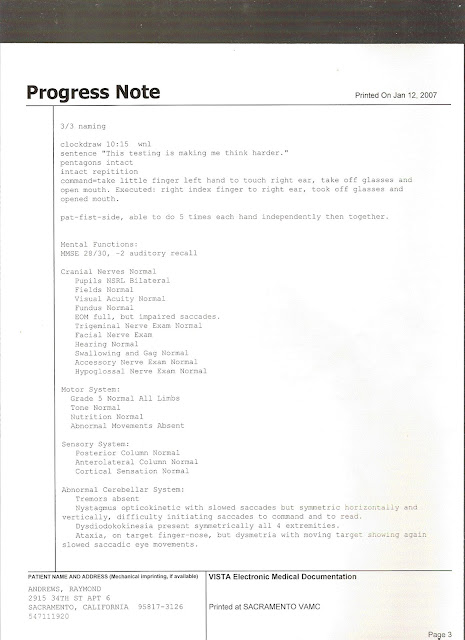My Neurodivergence Testing
Neurodivergence Testing
They are being shared to help people understand what an atypical neurological system is like. I also want to help people understand what type of testing is used.
Learning Disability/ADHD Assessment by a psychologist in 2004.
It led to a diagnosis of the following:
Inattentive Type ADHD
Generalized Anxiety Disorder
Dysthymic Disorder
Avoidant Personality Disorder
Per History: Developmental Coordination Disorder
Medical Diagnostic Testing including testing of nervous system and cerebellar vestibular system by Dr. Harold N. Levinson in 2005
It
led to a diagnosis of cerebellar vestibular dysfunction which he
believed is the root of neurodivergent conditions except for autism
which he believes is caused by cortical dysfunction.
Neurological and Neuropsychological Testing by Veteran Affairs Neurologists and Neuropsychologist in 2006.
It led to a diagnosis of Dyslexia and Dyspraxia.
Neuropsychological Testing by Veteran Affairs Neuropsychologists
Neurological Testing by Veteran Affairs Neurologists
Getting a second opinion is important if you feel that you weren't examined right. I had that issue with the psychologist who did the LD/ADHD assessment. She used a multiple choice reading test to test for reading issues. She also made statements that I can't be Dyslexic because I learned from phonics. Most Dyslexics have problems with auditory, phonological processing. International Dyslexia Association even stresses that. Phonics programs are often used with Dyslexics. If it wasn't for the combination of auditory therapy and speech therapy, I wouldn't have the phonemic awareness to be able to learn from phonics. Some of the stuff on the reading test is stuff that I have read before that included stuff on Carl Jung and Homer. I also have a habit of going back to the reading portion while answering the questions. My issue with reading is that I remember very little that I read. I can easily go blank after reading a page. The Veteran Affairs neuropsychological testing showed that my immediate visual memory was in the impaired range and my immediate verbal memory was in the borderline impaired range, and those immediate memory easily cause difficulty with remembering what's being read and said. The TOVA test is a computerized test that involves looking at rapidly moving stuff on a screen. I had extreme difficulty with it, and it wasn't because of attention deficits nor impulsivity. I had problems with the test because my eyes couldn't keep up with the fast moving stuff on the screen. I also ended up getting very dizzy that I felt like I was feeling the ground moving. I was pretty much getting motion sickness. I closed my eyes, and then I ended up putting my head down for the remainder of the test. Dr. Levinson's testing and Veteran Affairs neurologists' testing showed that I have problems with neurological processing, visual tracking, auditory processing, balance as well as the cerebellar vestibular system. TOVA is not a good test for testing ADHD. People with sensory integration issues, poor visual tracking, and vestibular problems can have serious problems with the test. Even ultrasensitive people can have problems with the test.
The Veteran Affairs neuropsychologist told me that I am slow to get something at first but REALLY learn it when I do learn it. In other words, my short term memory makes it hard for me get things at first and I am quick forgetter. With time, I learn better as it gets into my long term memory. People with Dyslexia, Dyspraxia, ADHD tend to have problems with short term/immediate memory but have long term memory strengths. This makes Dyslexics, Dyspraxics, and ADHDers to have problems with learning by rote and auditory sequential teaching methods that are used in most schools. She also told me that I have problems with strings of words, and that it didn't matter if it was visual or auditory. It means that I tend to have problems being overloaded with words that are being read and said. I find that it can be caused by a combination of auditory processing issues, eye tracking issues, and short term/immediate memory issues. It is also can be caused by my problems remembering sequences which effect my reading, listening, speech, writing, and coordination/motor skills. The LD/ADHD assessment psychologist, Dr. Levinson, Veteran Affairs neurologists, and Veteran Affairs noted that I have speech irregularities. They are connected to my Dyslexia (phonological issue) and Dyspraxia (coordination issue).
The Veteran Affairs neurologists confirmed that I have Dyslexia and Dyspraxia. They said that there were no apparent progression of impairments suggesting genetic rather than acquired. A lot of people in my family have neurodivergent symptoms, and so I am very sure that they are genetic.
The positives of the Veteran Affairs neuropsychological testing were:
I scored high average in visual construction as measured by block design. I earned time bonus points for the last and most difficult design. I actually did them faster as they got harder. The neuropsychologist confirmed my belief that I am a visual thinker. Of course, I don't need a test to know that. I think in pictures and visualize in my mind's eye all the time. I use visualization to help me comprehend what is being read and said. I also use it to help me write and speak. I use visualization to help me perform motor skills tasks that includes my visually planning before I do anything and visualizing visualize while I am doing things like I am seeing myself in a mirror. Verbal, word thinking is secondary thinking for me. I had to be taught to think like that. It did not come naturally to me as it did with most children. Auditory therapy, speech therapy, and phonics made it possible for me to be a verbal, word thinker. It was my showing visual spatial strengths in early childhood which got me recognized as having above average intelligence and didn't belong in the special education classroom with the intellectually handicapped. The neuropsychologist said that persons with strong visual skills who lack comparable verbal facility can often be frustrated because they have difficulty communicating their ideas in a highly verbal society, and that can be connected to my problems with speech. Like I said before, visual/picture thinking is my primary thinking and verbal/word thinking is my secondary thinking, and the latter had to be taught. This tends to be common with many neurodivergents.
l also scored high average range on list generation to a sound cue. She gave me letters and had me give me as many words that start with that letter.
I was just going through a lot of words in my head. I used a combination of visualization and using alphabetical order.
She noted that both tasks require complex and strategic thinking and suggest that I have some well-developed mental skills.
She told me I should be assured that I have learned to cope with my childhood learning problem and should feel confident about my ability to think through problems outside of the speeded academic settings which I have experienced failues. She said that the statement is not intended to to convey that I do not continue to experience these difficulties, but that I have learned effective ways to cope with them when I am not stressed. She told me that I should be encouraged to find ways to make better use of my strong visual spatial skills whether through a hobby or some other outlet.
She told me that I should consider seeking to establish a trusting relation with a mental health professional. She noted that I articulated my problems with self-esteem, sensitivity, and reactivity well. She noted that my childhood problems in school and with a difficult family situation that provides me with little emotional support combine to make me vulnerable to recurring episodes of depression and professional support would be useful for me.
Many people with neurological, learning differences have history of mental health problems. Learning issues can lead to mental health problems and vice versa. That's why learning disability assessment always includes mental health screening. Furthermore, neurological disorders can cause depression. That's why the Veteran Affairs neurologists had me tested for Wilson's Disease and Huntington's Disease because of my having both neurological processing irregularities and depression. I tested negative for them. My Depression stemmed from insecurity and low self esteem due to my experiences as a neurodivergent. Many neurodivergents can relate.
This gives you an idea of the testing of a neurodivergent.




























.png)


Comments